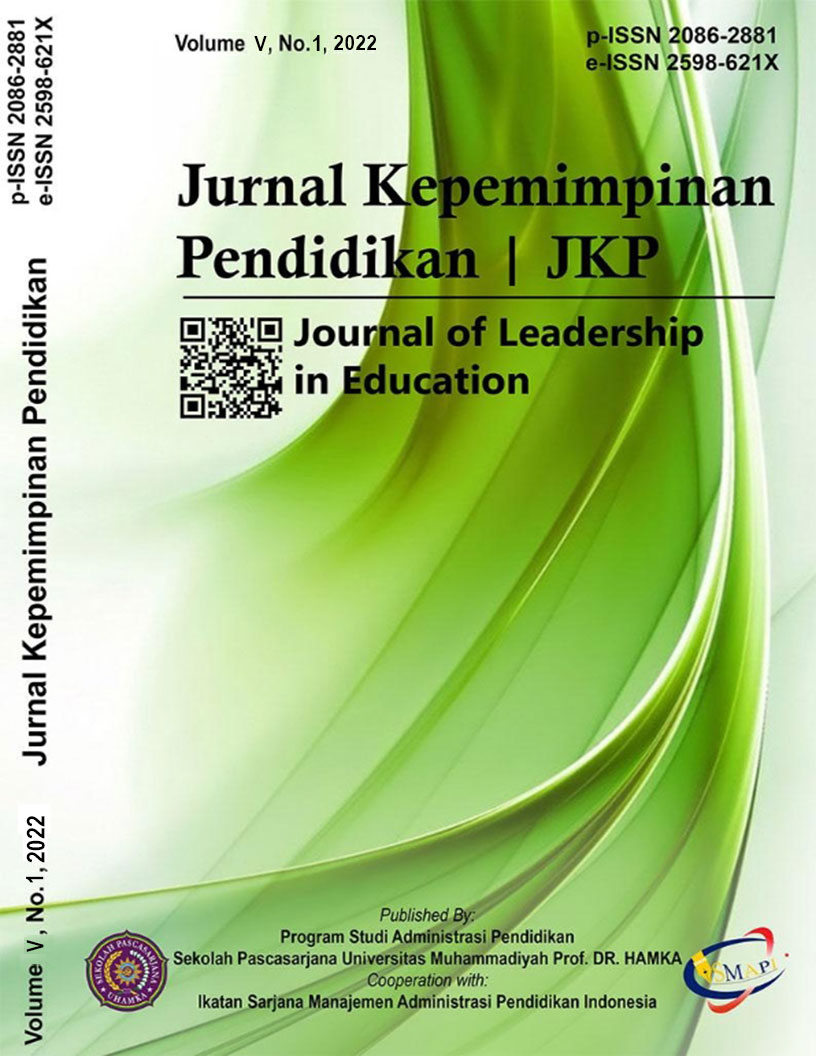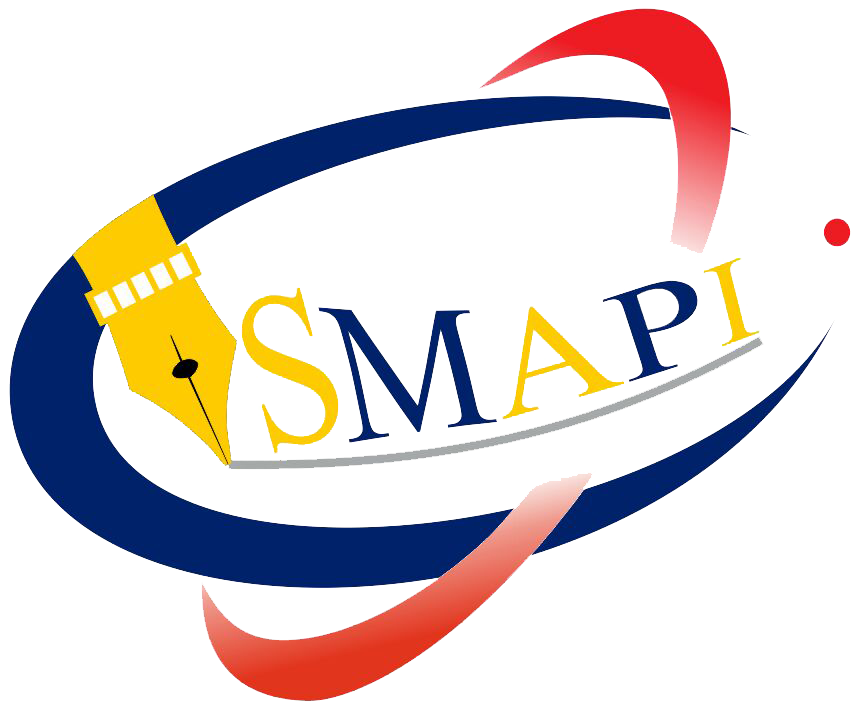EVALUATION OF INTEGRATED ISLAMIC SCHOOL NETWORK IMPLEMENTATION
DOI:
https://doi.org/10.22236/jkpuhamka.v5i1.9240Keywords:
evaluation, model discrepancy, curriculumAbstract
This research aims to reveal and assess the implementation of the integrated islamic school network curriculum at SDIT Harum, North Jakarta. The approach method used in this study is an evaluative approach, where the researcher intends to collect data on policy implementation. The evaluation model chosen in this study is the Discrepancy Evaluation Model (DEM), by collecting and using observations, structured interviews and documentation. The design of the integrated islamic school network curriculum is a combination of the content of the integrated islamic school network curriculum, the content of the national curriculum and local content. the integrated islamic school network curriculum places more emphasis on internalizing Islamic values in every content of the National curriculum. Implementation with good and correct worship habits becomes a reinforcement in the development of student character. Implementation of the JSIT curriculum, but all of this must be a perception of thinking and acting by providing self-development and training or web wins for HR at SDIT Harum. Discrepancy evaluation is one type of evaluation approach in evaluating a integrated islamic school network curriculum program. The results of this evaluation are to find out the gaps that occur between the expected conditions and the reality in the field, the next step in making decisions.
Downloads
References
Alter, K. (1998). Electrical Construction Management Specialization Program: A Formative Evaluation. Journal of Construction Education, 3(2), 60–72.
Arifin, Z. (2019). Evaluasi Program: Teori dan Praktek Dalam Konteks Pendidikan dan Nonpendidikan. Bandung: PT Remaja Rosdakarya.
Arikunto, Suharismi, & Jabar, C. S. A. (2014). Evaluasi Program Pendidikan. Jakarta: Bumi Aksara.
Arikunto, Suharsimi, & Jabar, C. S. A. (2009). Evaluasi Program Pendidikan: Pedoman Teoretis Praktis bagi Mahasiswa dan Praktisi Pendidikan. Jakarta: Bumi Aksara.
Chairunnisa, C. (2016). Manajemen Pendidikan Dalam Multi Perspektif. Depok: PT RajaGrafindo Persada.
Chariri, A. (2016). Landasan Filsafat Dan Metode Penelitian Kualitatif. Prosiding Workshop Metodologi Penelitian Kuantitatif Dan Kualitatif, Laboratorium Pengembangan Akuntansi (LPA), (June). Semarang.
Creswell, J. W. (2007). Qualitative Inquiry and Research Design: Choosing Among Five Approaches. In Health Promotion Practice (Second Edi, Vol. 16). https://doi.org/10.1177/1524839915580941
Fitzpatrick, J. L., Sanders, J. R., & Worthen B. R. (2011). Program Evaluation: Alternative Approaches and Practical Guidelines. Boston: Pearson.
Frye, A. N. N. W., & Hemmer, P. A. (2012). Program Evaluation Models and Related Theories"¯: AMEE Guide. Med. Teach. J, 34(67), 288–299. https://doi.org/10.3109/0142159X.2012.668637
Ghani, A. R. . (2014). Metode Penelitian Tindakan Sekolah. Jakarta: Raja Grafindo Persada.
Hill, D. L., Chestnut, Madaus, F, G., & Stufflebeam. (2012). Evaluation Models"¯; Viewpoints on Educational and HUman Services Evaluation. New York: Kluwer Academic Publishers.
Lembaga Negara Republik Indonesia. (2003). Undang-undang nomor 20 tahun 2003 tentang Sistem Pendidikan Nasional.
Miles, M. B., Huberman, A. M., & Saldana, J. (2014). Qualitative Data Analysis A Methodz Sourcebook (3rd ed.). London: Sage Publication.
Moleong, L. J. (2017). Metode Penelitian Kualitatif. Bandung: Remaja Rosdakarya.
Muryadi, A. D. (2017). Model Evaluasi Program dalam Penelitian Evaluasi. Jurnal Ilmiah PENJAS, 3(1), 1–15.
Nugrahani, F. (2014). Metode Penelitian Kualitatif dalam Penelitian Pendidikan Bahasa. Solo: Cakra Books.
Peraturan Mentri Pendidikan Nasional No 65 Tahun 2013 tentang Standar Proses.
Peraturan Mentri Pendidikan Nasional No 65 Tahun 2013 tentang Standar Kompetensi Lulusan.
Peraturan Pemerintah No. 19 Tahun 2005 tentang Standar Nasional Pendidikan..
Prihantoro, C. R. (2014). The perspective of curriculum in Indonesia on environmental education. International Journal of Research Studies in Education, 4(1), 77–83. https://doi.org/10.5861/ijrse.2014.915
Ramayulis. (2010). Ilmu Pendidikan Islam. Jakarta: Kalam Mulia.
Ratnawulan, E., & Rusdiana, H. . (2014). Evaluasi Pembelajaran Dengan Pendekatan Kurikulum 2013. Bandung: Pustaka Setia.
Riduwan. (2013). Skala Pengukuran Variabel-Variabel Penelitian. Bandung: Alfabeta.
Robingatin, S. (2015). Implementasi Kurikulum Jaringan Sekolah Islam Terpadu di Sekolah Menengah Pertama Islam Terpadu. SYAMIL: Jurnal Pendidikan Agama Islam (Journal of Islamic Education), 3(1), 127–154. https://doi.org/10.21093/sy.v3i1.24
Roziqin, Z. (2019). Menggagas Perencanaan Kurikulum Sekolah Unggul. AsSabiqun : Jurnal Pendidikan Islam Anak Usia Dini, 1(1), 45.
Sanjaya, W. (2010). Kurikulum dan Pembelajaran: Teori dan Praktik Pengembangan KTSP. Jakarta: Kencana.
Semiawan, C. R. (2010). Metode Penelitian Kualitatif Jenis, Karakteristik dan Keunggulannya. Jakarta: Grasindo.
Siregar, E., & Nara, H. (2011). Teori Belajar dan Pembelajaran. Bogor: Ghalia Indonesia.
Sugiyono. (2019). Metode Penelitian Kuantitatif Kualitatif dan R&D. Bandung: Alfabeta.
Sukardi. (2015). Evaluasi Program Pendidikan dan Kepelatihan (Cetakan Ke; Y. S. Hayati, ed.). Jakarta: PT Bumi Aksara.
Suyatno, S. (2015). Sekolah Islam Terpadu Dalam Peta Sistem Pendidikan Nasional. ALQALAM. https://doi.org/10.32678/alqalam.v32i2.553
Tapiardi, W. (1996). Motivasi Belajar dan Pembelajaran.
Vedung, E. (2009). Public Policy and Program Evaluation. New Jersey: Transactions Publishers.
Wahab, R. 2013. Konsep sekolah Islam terpadu.
Widoyoko, S. E. P. (2013). Evaluasi Program Pembelajaran: Panduan Praktis bagi Pendidik dan Calon Pendidik. Yogyakarta: Pustaka Pelajar.
Wiersma, William, (1986). Research Methods In Education: An Introduction Massachusetts: Allyn and Bacon, Inc.
Yusup, M. (2017). Eksklusivisme Beragama Jaringan Sekolah Islam Terpadu (JSIT) Yogyakarta. Religi, 13(October), 75–96.















